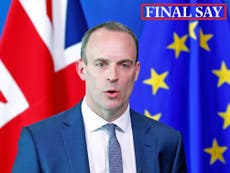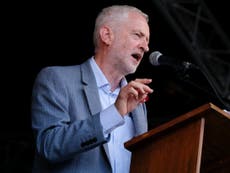If Brexit negotiations have taught us anything, it’s that our future should not be left to 650 politicians in London
The prime minister has proposed a half-in, half-out plan for a hard Brexit that has pleased no one, least of all the electorate

The parliamentary recess starts on Wednesday. As ever, it will be reported that MPs are about to start a long five-and-a-half-week “holiday”. Except that’s not quite how it works.
The hundreds of letters and emails we get every week keep rolling in and have to be dealt with – putting an “out of office” auto-response on is not an option (save perhaps during Christmas week). Most MPs take advantage of the fact we are not chained to Westminster to vote during recess, so people spend much more time in the constituency, attending summer events, visiting organisations and the groups it is usually impossible to diarise due to parliamentary commitments. And the nature of this unusual job is such that there will always be unforeseen, exceptional events that you have to intervene in or speak about as one of the main advocates for the community you represent – the August 2011 riots, which affected my area, were a good example.
What have we learnt since the last proper recess over the Easter period? Parliament is gridlocked on Brexit. While there is a majority in the House of Commons against the negative proposition of the UK leaving the European Union without a deal, there is no consensus around any positive proposition on how we leave and the prime minister’s Chequers proposals don’t seem to have pleased anyone.
This appears to be reflected among the electorate. The latest polls back this up. YouGov polled how people would vote if they did have a final vote on the Brexit deal: 38 per cent opted to leave with no deal, 50 per cent sought to remain in the EU, and just 11 per cent opted to leave with the PM’s Chequers proposals.
All of this makes the case for a vote on the final Brexit deal even more urgent. If the proposals which the PM is pursuing feel unacceptable to the majority of the electorate, that says something. People voted to leave and to remain for very different reasons, but it’s nonsense to say that every single person who voted for Brexit in the EU referendum did so because they unanimously agreed on leaving the single market and the customs union, putting the Good Friday Agreement at risk, garnering no extra money for the NHS (contrary to what they were told) and potentially continuing years of austerity.
When the choice was merely between in and out, we had no room for nuance. Now that we’ve lived with the consequences – and the debunked “facts” – from the initial referendum for over a year, it’s time to give power back to the electorate and allow them to vote on a ballot paper that allows for the people to determine what we do on the final Brexit deal – whether to leave with a bad deal or remain and reform our country within the EU.
It is proving impossible to deliver Brexit in the form it was sold to the British people. The central pledge of Vote Leave revolved around the claim that £350m extra a week will go into the NHS after Brexit, but the government’s own independent fiscal watchdog, the Office for Budget Responsibility, said last week that their “provisional analysis suggests Brexit is more likely to weaken than strengthen the public finances overall”. The NHS claim was always a myth – now it’s official.
Even if you leave aside the money issue, the NHS has huge understaffing problems now and the Brexit vote has exacerbated them. Ten thousand EU health workers left the NHS in the 12 months after the Brexit vote and there has been a drop of nearly 90 per cent in the number of nurses from the EU registering to work in the UK, and a 94 per cent drop in the number of midwives, just when we need more medical staff. No wonder the British Medical Association (BMA), the Royal College of Nursing and the Royal College of Midwives have all adopted positions in favour of a vote on the Brexit deal. The BMA’s Dr John Chisholm said Brexit was “a disastrous act of national self-harm” and that the EU was better for the UK’s NHS, public health, research, science, universities, access to pharmaceuticals and international cooperation in research.
Then we were told that, so keen are EU states to sell us cars, wine, prosecco, brie and goodness knows what else, they would afford us the “exact same economic benefits” of EU membership without being subject to any of the rules or obligations that come with being in the club. The prime minister herself conceded that this was a myth in her Mansion House speech back in March, conceding that we will have less access to our biggest market as a result, making the UK poorer.
We already knew this after her ministers were forced by parliament to disclose their economic impact assessments on the impact of the Brexit vote on the economy when they were leaked. No serious economist is claiming it will do anything other than damage to the economy. Indeed, since 2016 Britain has gone from the fastest growing major advanced economy in the world to the slowest today.
And no one had any idea that we would have to foot a huge Brexit divorce bill of over £40bn with ongoing payments carrying on to 2064 – perhaps the biggest new fact of all which has come to light since the start of the year. That sum was never plastered along the side of Boris Johnson’s big red bus.
Do the prime minister’s Chequers proposals do anything to mitigate these new realities? Absolutely not. What she has proposed is a half-in, half-out plan for a hard Brexit that has pleased no one. It doesn’t meet the needs of many businesses and unions, particularly those in the services sector that account for 80 per cent of our economy.
The hard Brexit right of the Tory party won’t buy it because it stops Britain operating independently of all EU rules in the way they would want; on the other side, it doesn’t meet the Labour Party’s six tests so the opposition can’t support it.
The EU itself will, in the end, reject May’s proposals because they threaten the integrity of the single market and don’t respect fundamental EU rules and principles. The EU is clear we can’t cherry-pick those parts of the EU framework we like and leave other aspects – which is precisely what the Chequers plan seeks to do. There are also big doubts about its practicality and no belief that it provides a workable solution to the Irish border issue. After the plans was announced by May, one foreign minister of a major EU state said to me quite bluntly: “It just won’t work.”
Above all, the Chequers car crash, which led to Boris Johnson and David Davis’s cabinet resignations, offers Britain no influence on the terms of our association with the EU. The EU would hold all the cards and call all the shots. No matter how the PM wants to spin it, it will be the EU Commission, the European Parliament, the EU Council and the EU’s Court of Justice that would be setting the rules. It is the very opposite of taking back control.
There have also been the shocking revelations about the Vote Leave campaign. We know it told some gargantuan lies (see the NHS above), but we now know it cheated too. There was a 4 percentage point gap between Leave and Remain in 2016 but Vote Leave overspent by just under 8 per cent. As I said in the House of Commons last week, we therefore cannot say with confidence that this foul play did not impact on the result.
Opinium asked the public about this at the end of last week – two thirds of people think Vote Leave cheating is a “serious matter” and half of those expressing a view thought this affected the result. These shocking revelations call into question the legitimacy of the whole process.
Whatever your opinion on Brexit, we can all agree that it is a big deal. It will affect us – and particularly young people – for generations.
What the government comes back with will not be what was promised in 2016; 2018 is a different kettle of fish. Given everything that has happened and what we know now, it should not be left to 650 politicians in London to decide our future – 65 million people’s voices have to be heard. It’s the only way to break the deadlock. That is why The Independent is right to be calling for a vote on the final Brexit deal.
Chuka Umunna is Labour MP for Streatham






Join our commenting forum
Join thought-provoking conversations, follow other Independent readers and see their replies